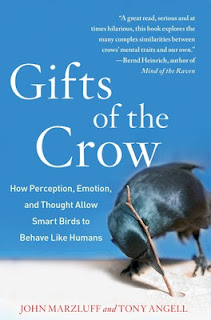Salish Sea Communications blog: “You can’t blame everything about the zombie-like progress of Puget Sound recovery on the economic downturn.” On Saving Puget Sound
Cliff Mass writes: “The May climatological numbers are in and the contiguous U.S. has had its second warmest May on record. But guess what region did not share in the balmy conditions? You guessed it...the Pacific Northwest.” Depressing But True
Crows have a bad rap for being loud, lurking creatures that overpopulate the city. Often used as figures in art, film and literature, they're considered clever creatures at best. But researchers insist crows are much more complex. In fact, crows and other corvidae are more like humans in their ability to communicate, feel emotion and understand cause and effect. Authors John Marzluff and Tony Angell illustrate the depth of these intelligent creatures in their new book, Gifts Of The Crow. What can we learn from our neighbors in the sky? And what do they learn from us? Gifts Of The Crow (at 13.55)
Rising river levels fed by heavy rains have triggered flood warnings and evacuation alerts in parts of B.C. The River Forecast Centre issued a flood warning for the Prince George area Thursday, predicting flooding along sections of the Fraser River and warning people to stay away from river banks that may be eroded by fast moving water. The centre says the river could begin to recede by Friday. Heavy rains and rising rivers trigger B.C. flood warnings, evacuation alert
The number of major forest fires in B.C. will likely increase by 50 per cent or more in the next 40 years according to a recent report on climate change. Telling the Weather Story, released this week by the Insurance Bureau of Canada, addresses altering weather patterns across the country in the coming decades and urges Canadians to adjust to the realities of climate change. Climate change to bring more severe wildfires to B.C.: report
Mill Hill Regional Park will look a little less yellow after Wednesday’s removal by helicopter of bundles of Scotch broom. Over the last decade, nearly 63 tonnes of invasive weeds have been removed from the 71-hectare park in Langford. The park was closed Wednesday while a helicopter hoisted bundles of broom from the mountainous park and dropped them in the lower parking lot for transport. The shrubs will be processed into biofuel at a commercial facility. Helicopter helps with removal of invasive Scotch broom at Mill Hill
Contractors with the Environmental Protection Agency will be photographing and sampling beach sediment on the North Shoal East Beach in June and July, the agency announced. The sampling will help locate and determine the size of pools of creosote under the beach sediment, and is part of the ongoing study of the Wyckoff/Eagle Harbor Superfund site. EPA collects samples at North Shoal site
Toronto has become the largest city in North America to opt for an outright ban on the use of plastic bags. The ban was approved by the city council despite Mayor Rob Ford originally only seeking to overturn an existing five cent levy. Plastic bag bans already exist in Seattle, San Francisco and in Fort McMurray, Alberta. Toronto plastic bag ban surprises Mayor Rob Ford
When half of all bees began mysteriously dying in the US and parts of Europe and Asia six years ago, beekeepers and food growers took note. What’s happened since then? Are honeybees in recovery? And what about those watermelons, apples and cherries we couldn’t live without? Martha Baskin reports. The Buzz on an Otherwise Quiet Environmental Crisis: Colony Collapse Disorder and the Food We Eat See also: Highly Contagious Honey Bee Virus Transmitted by Mites
Experts worldwide have long talked about the importance of preserving the diversity of life for the sake of beauty and wonder, or in the hopes of new medical discoveries, or for moral reasons. A group of scientists is reporting that biodiversity also helps sustain human life. Biodiversity helps sustain human life, scientists say
Now, your weekend tug weather--
WEST ENTRANCE U.S. WATERS STRAIT OF JUAN DE FUCA- 300 AM PDT FRI JUN 8 2012
SMALL CRAFT ADVISORY IN EFFECT THROUGH THIS AFTERNOON
TODAY
E WIND 15 TO 25 KT. WIND WAVES 2 TO 4 FT. W SWELL 6 FT AT 10 SECONDS. SHOWERS AND A CHANCE OF THUNDERSTORMS.
TONIGHT
W WIND 10 TO 20 KT...BECOMING SW 10 TO 15 KT AFTER MIDNIGHT. WIND WAVES 1 TO 3 FT. W SWELL 7 FT AT 11 SECONDS. A CHANCE OF SHOWERS EARLY.
SAT
W WIND 10 TO 15 KT...RISING TO 15 TO 25 KT IN THE AFTERNOON. WIND WAVES 1 TO 2 FT BUILDING TO 2 TO 4 FT. W SWELL 6 FT AT 10 SECONDS. A CHANCE OF SHOWERS.
SAT NIGHT
W WIND 15 TO 20 KT...EASING TO 10 TO 15 KT AFTER MIDNIGHT. WIND WAVES 1 TO 3 FT. W SWELL 6 FT.
SUN
W WIND 10 KT. WIND WAVES 1 FT. SW SWELL 5 FT.
--
"Salish Sea News & Weather" is compiled as a community service by Mike Sato. To subscribe, send your name and email to: msato@salishseacom.com. Your email information is never shared and you can unsubscribe at any time.
Salish Sea News: Communicate, Educate, Advocate
Follow on Twitter.
Salish Sea Communications: Truth Well Told

No comments:
Post a Comment
Note: Only a member of this blog may post a comment.